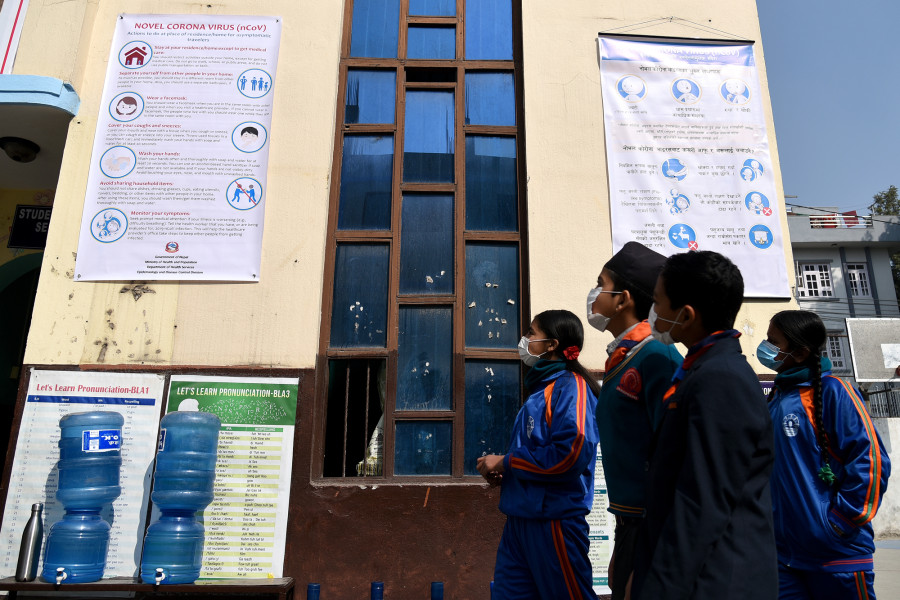National
Without a clear statement from the federal government regarding Covid-19, misinformation spreads at local level
In times of crises, Singha Durbar, in coordination with provincial and local governments, should issue an unambiguous statement, say federal and health experts.
Tika R Pradhan
The Kathmandu District Administration Office on Thursday issued a notice calling on members of the general public to take precautionary measures and avoid gatherings, given the global outbreak of Covid-19, a disease caused by a new strain of coronavirus.
“At a time when the government has urged necessary precautions against the Covid-19 and the World Health Organisation has said Nepal is at a high risk of spread of the disease, we request the people of Kathmandu district to not take part in and organise any programmes like celebrations, fairs and festivals [including Holi] until further notice,” states the statement.
The Dhangadhi Sub-Metropolitan City, on Wednesday, issued a similar notice, urging citizens to stay away from public gatherings and take precautions but also bizarrely advising locals to use turmeric and garlic to prevent Covid-19. There is no scientific evidence that turmeric and garlic prevent the disease.
These two notices are instances of how local governments are issuing separate, often contradictory, notices to their residents. As the coronavirus continues to spread across the world, it is more necessary than ever for a single authoritative voice to put out reliable, scientific evidence regarding Covid-19. With all three tiers of government putting out statements of their own, reliable information can often be lost in the cacophony, leading to misinformation.
Instead, federal government officials have gone on to make irresponsible statements regarding the outbreak. On February 3, Tourism Minister Yogesh Bhattarai went so far as to boast that Nepal was a “corona-free zone”.
According to federal administration experts, federalism doesn’t just mean delegating authority but also entails acting in coordination with lower-level governments when there is the need for a strong single voice to eliminate confusion among the public.
“Ministries of the federal government, especially the Health Ministry, should have issued a common message in coordination with the line ministries at the provincial government to avoid unnecessary confusion at this time of crisis,” said Khimlal Devkota, an expert on federalism who has served on the planning commission for Bagmati Province. “The federal government should consult with organisations from municipalities and rural municipalities and devise a common message to disseminate.”
At a time when the government is facing criticism for failing to make necessary preparations to prevent the spread of Covid-19, the KP Sharma Oli administration has also failed to issue necessary information and notices on time to eliminate confusion and prevent misinformation.
Even authorities at the local level believe that it would be easier for them if the federal government issued a general notice for all citizens.
“With no information from the federal government and increasing concern from the people, I was also thinking of issuing a notice regarding the coronavirus,” said Raju Gurung, chief of the Siranchowk Rural Municipality in Gorkha. “Local units do not have adequate expertise on issues related to global health and adequate information so separate notices on such a serious issue could misinform the public.”
Gurung’s concerns regarding the lack of information are valid, especially in light of Dhangadhi’s advice to employ turmeric, garlic and calamus (bojho). Earlier this week, The Economist magazine advised governments to “talk to the public” and provided the US’ Centres for Disease Control as an example saying the American federal public health agency had “issued a clear, unambiguous warning”.
As The Economist pointed out, the Centres for Disease Control is a stellar example of a federal agency that coordinates the national response to a public health crisis in a country that takes its states’ rights very seriously. But here in Nepal, the government has yet to even issue a coordinated response to the coronavirus, let alone a national plan to deal with the outbreak if it arrives in Nepal.
“The government has neither made proper and timely preparations to tackle the outbreak nor has it formed a mechanism to disseminate necessary information to the public,” said Devkota. “This is a serious mistake on the part of the federal government.”
According to public health experts, the issue arose because existing legal provisions allow the chief district officer to take necessary actions in case of serious public health issues.
“Our existing law still allows the chief district officer to take necessary action during a public health crisis,” said Dr Baburam Marasini, former chief of the Epidemiology and Disease Control Division. “The government could still bring all of them together and issue one statement. There needs to be an integrated approach.”
Despite calls, warning and media reports, the Nepal government was slow to recognise the threat of the outbreak. It took months for the government to step up measures at Tribhuvan International Airport—equipping the health desk with human resources and equipment like thermal scanners and laser thermometers.
Now, with coronavirus cases spiking in neighbouring India, with which Nepal shares a 1,800 kilometre-long border, experts are concerned about the spread of the disease in densely-populated regions where health systems are weak.
While Bhanubhakta Dhakal, the minister for health and population, said that the federal government is working on an integrated information system to disseminate proper information across the country in close coordination with lower governments, experts believe that it might be too late as misinformation is already spreading. But a quick coordinated response could still prevent panic and confusion among the public, they say.
Since the infection was first detected in Wuhan, China in late December, Covid-19 has spread to 85 countries, killing 3,287 and sickening 95,607 people so far.




 16.12°C Kathmandu
16.12°C Kathmandu













